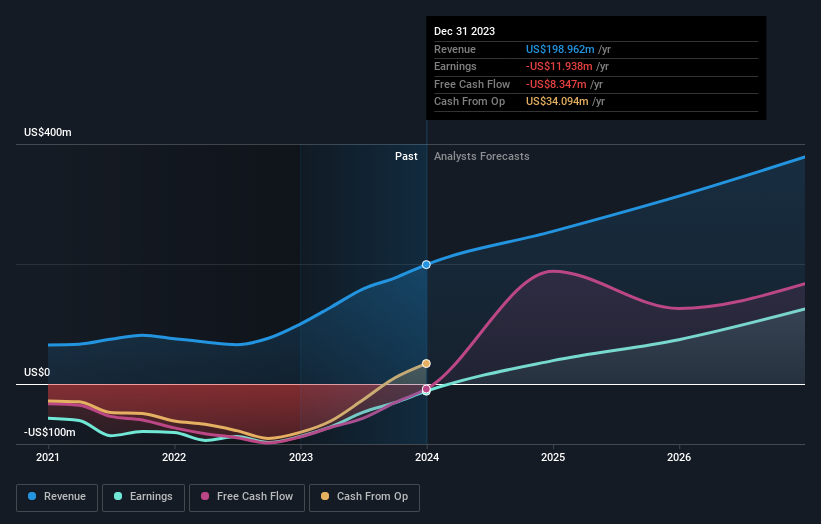MannKind Corporation (NASDAQ:MNKD) down to US$1.2b market cap, but institutional owners may not be as affected after a year of 9.7% returns
Key Insights
Given the large stake in the stock by institutions, MannKind's stock price might be vulnerable to their trading decisions
A total of 25 investors have a majority stake in the company with 42% ownership
Ownership research along with analyst forecasts data help provide a good understanding of opportunities in a stock
Every investor in MannKind Corporation (NASDAQ:MNKD) should be aware of the most powerful shareholder groups. And the group that holds the biggest piece of the pie are institutions with 49% ownership. In other words, the group stands to gain the most (or lose the most) from their investment into the company.
Losing money on investments is something no shareholder enjoys, least of all institutional investors who saw their holdings value drop by 7.6% last week. However, the 9.7% one-year return to shareholders might have softened the blow. But they would probably be wary of future losses.
Let's take a closer look to see what the different types of shareholders can tell us about MannKind.
Check out our latest analysis for MannKind
What Does The Institutional Ownership Tell Us About MannKind?
Institutions typically measure themselves against a benchmark when reporting to their own investors, so they often become more enthusiastic about a stock once it's included in a major index. We would expect most companies to have some institutions on the register, especially if they are growing.
As you can see, institutional investors have a fair amount of stake in MannKind. This can indicate that the company has a certain degree of credibility in the investment community. However, it is best to be wary of relying on the supposed validation that comes with institutional investors. They too, get it wrong sometimes. When multiple institutions own a stock, there's always a risk that they are in a 'crowded trade'. When such a trade goes wrong, multiple parties may compete to sell stock fast. This risk is higher in a company without a history of growth. You can see MannKind's historic earnings and revenue below, but keep in mind there's always more to the story.
MannKind is not owned by hedge funds. Our data shows that BlackRock, Inc. is the largest shareholder with 8.2% of shares outstanding. In comparison, the second and third largest shareholders hold about 5.6% and 4.8% of the stock. Additionally, the company's CEO Michael Castagna directly holds 0.8% of the total shares outstanding.
A deeper look at our ownership data shows that the top 25 shareholders collectively hold less than half of the register, suggesting a large group of small holders where no single shareholder has a majority.
While studying institutional ownership for a company can add value to your research, it is also a good practice to research analyst recommendations to get a deeper understand of a stock's expected performance. There are plenty of analysts covering the stock, so it might be worth seeing what they are forecasting, too.
Insider Ownership Of MannKind
While the precise definition of an insider can be subjective, almost everyone considers board members to be insiders. The company management answer to the board and the latter should represent the interests of shareholders. Notably, sometimes top-level managers are on the board themselves.
I generally consider insider ownership to be a good thing. However, on some occasions it makes it more difficult for other shareholders to hold the board accountable for decisions.
We can see that insiders own shares in MannKind Corporation. It is a pretty big company, so it is generally a positive to see some potentially meaningful alignment. In this case, they own around US$29m worth of shares (at current prices). If you would like to explore the question of insider alignment, you can click here to see if insiders have been buying or selling.
General Public Ownership
The general public-- including retail investors -- own 48% stake in the company, and hence can't easily be ignored. While this size of ownership may not be enough to sway a policy decision in their favour, they can still make a collective impact on company policies.
Next Steps:
It's always worth thinking about the different groups who own shares in a company. But to understand MannKind better, we need to consider many other factors. For instance, we've identified 2 warning signs for MannKind (1 shouldn't be ignored) that you should be aware of.
If you are like me, you may want to think about whether this company will grow or shrink. Luckily, you can check this free report showing analyst forecasts for its future.
NB: Figures in this article are calculated using data from the last twelve months, which refer to the 12-month period ending on the last date of the month the financial statement is dated. This may not be consistent with full year annual report figures.
Have feedback on this article? Concerned about the content? Get in touch with us directly. Alternatively, email editorial-team (at) simplywallst.com.
This article by Simply Wall St is general in nature. We provide commentary based on historical data and analyst forecasts only using an unbiased methodology and our articles are not intended to be financial advice. It does not constitute a recommendation to buy or sell any stock, and does not take account of your objectives, or your financial situation. We aim to bring you long-term focused analysis driven by fundamental data. Note that our analysis may not factor in the latest price-sensitive company announcements or qualitative material. Simply Wall St has no position in any stocks mentioned.

 Yahoo Finance
Yahoo Finance 

